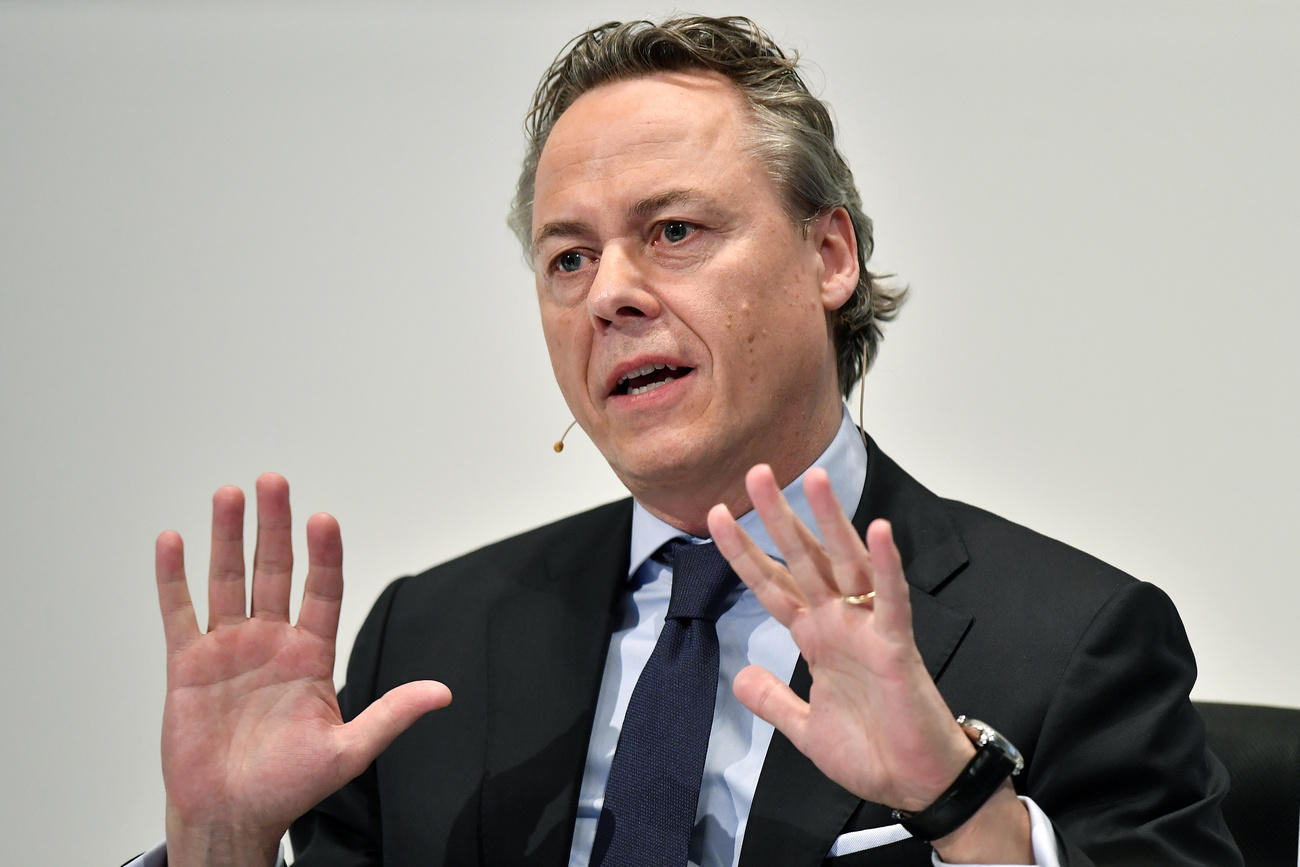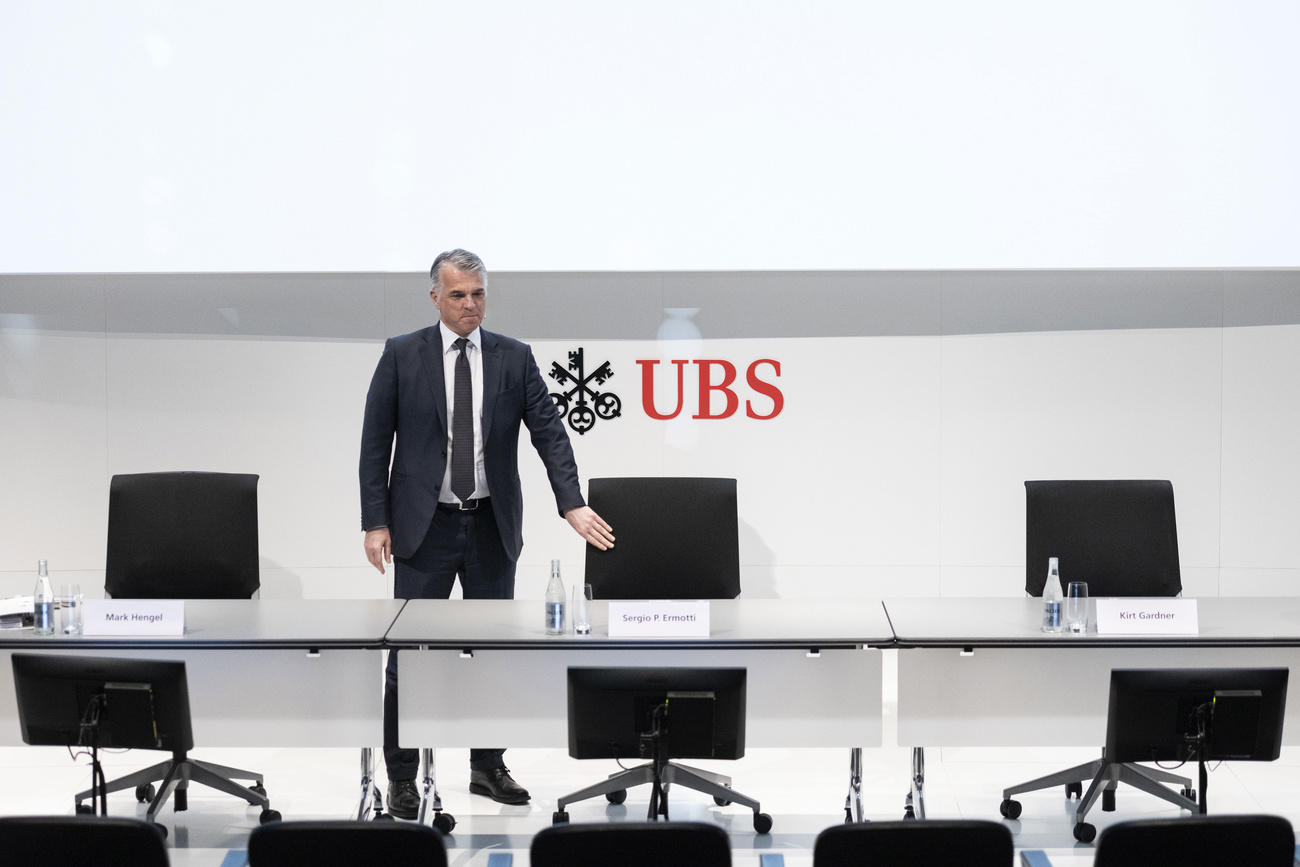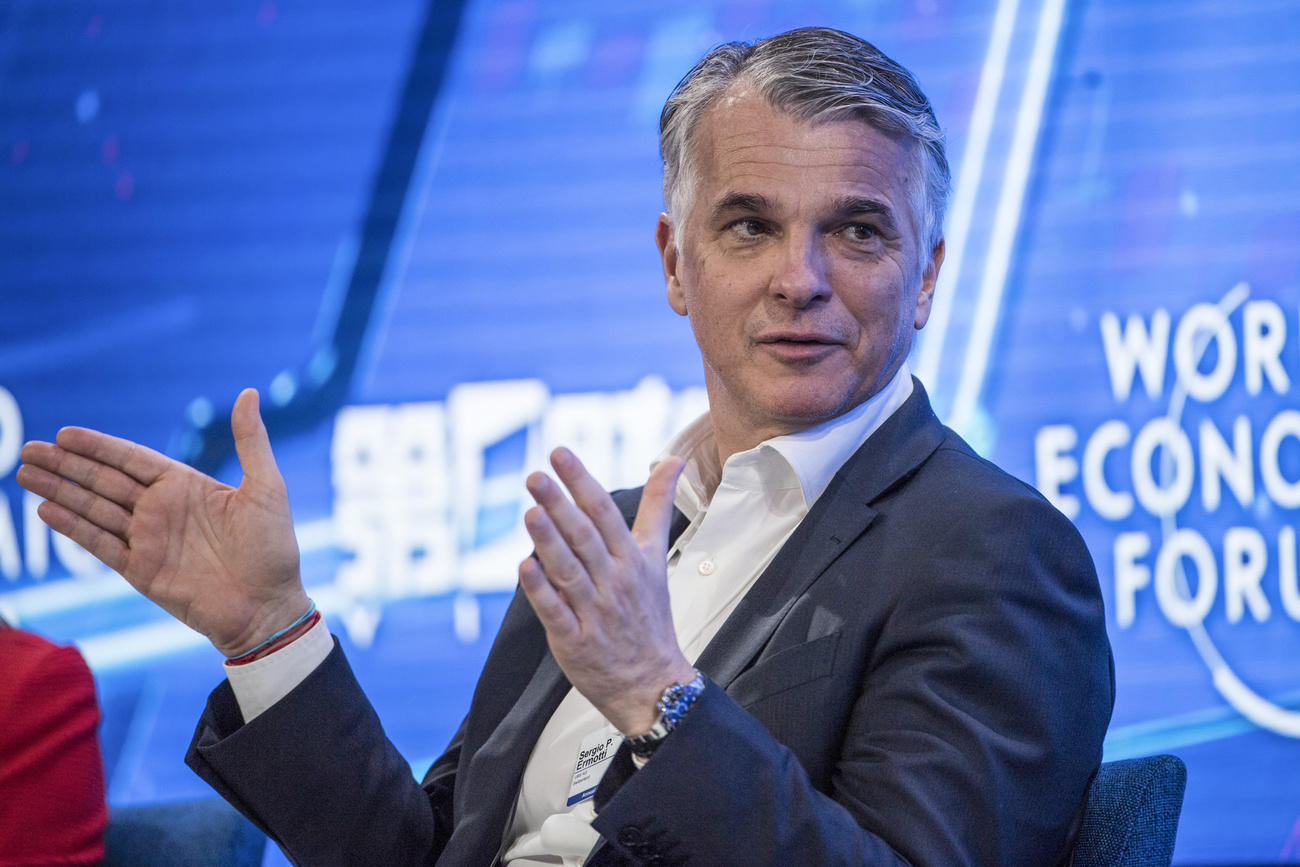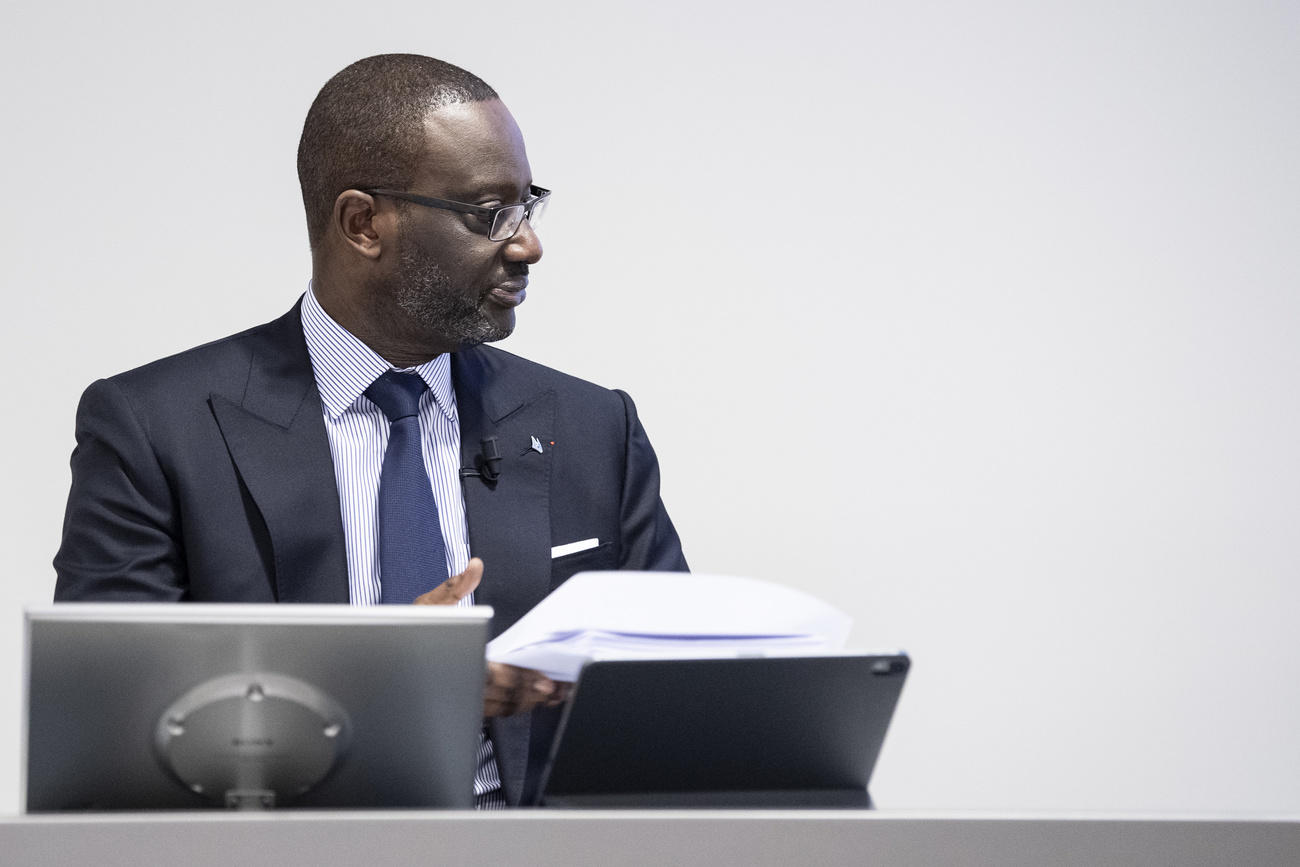Non-flying Dutchman takes the helm at UBS

Ralph Hamers tries to avoid flying. The eco-friendly ING chief executive prefers to drive the five hours between Frankfurt and Amsterdam in a hybrid BMW. He had to make an exception on Thursday morning, however.
After the Financial Times revealed late on Wednesday night his surprise appointment as successor to Sergio Ermotti as chief executive of UBS, the Swiss bank insisted he took the first flight to Zurich to attend a hastily convened 11.30am press conference.
When he arrived, Mr Hamers, known for his informal style, was teased by Mr Ermotti about remembering a tie this time, after he had had to lend the Dutchman one at a past event.

It was a flying visit; Mr Hamers was back in ING’s Amsterdam HQ a few hours later.
Now Mr Hamers, who has never worked for a top-tier securities house or run a wealth manager, has moved into one of the most powerful — and challenging — positions in global finance.
He speaks German, an essential qualification considering this is the first time in UBS’s history that it will have both a non-Swiss chairman and chief executive. When he joins the Swiss lender in September, he will be charged with galvanising revenues and taking an axe to persistently high costs.
While both banks rank among the world’s most “systemically important banks”, UBS marks a step-up in prestige from the Dutch lender. Its world-leading $2.6tn wealth management business and investment bank mean its market value, staff numbers, and international prominence are all significantly higher than those of ING.
Orderly transition
UBS’s priority for its chief executive succession was an orderly transition, said people involved in the process, something that has eluded the bank in the past two decades as it struggled through scandals including a $60bn state bailout and a $2bn rogue-trading affair. The resulting internecine conflict claimed several heads, including that of Mr Ermotti’s predecessor, Oswald Grübel, in 2011.
The board had one eye on the debacle at Credit Suisse — where two weeks ago chief executive Tidjane Thiam lost a bitter boardroom battle — and the other on Santander’s aborted attempt to recruit former UBS dealmaker Andrea Orcel as CEO, which has resulted in a €100m lawsuit.
“We just needed to look out the window to see how succession is done badly,” said one person involved in the process, referring to Credit Suisse’s Zurich headquarters opposite UBS.
Therefore UBS was careful to stress that Mr Hamers was the preferred successor of both Mr Ermotti and chairman Axel Weber — who had occasionally sparred in recent years as the bank’s performance stuttered.
“This is not about changing strategy, this is about changing CEOs,” Mr Weber said at Thursday’s press conference, the three men lined up on stage, side by side.
Mr Hamers is “a well-respected CEO” who has “strong credentials in digital and automation”, said Jonathan Fearon, investment director at Aberdeen Standard, who holds shares in both banks. “We would be surprised to see a radical departure from the existing strategy.”
Shock
While there had been reports that Mr Ermotti might leave in 2020, both the timing and the identity of the new chief executive came as a shock to many.
“None of the investors we had spoken to had suggested Mr Hamers as one of the potential candidates,” said Barclays analyst Amit Goel.
Directors at ING were blindsided by the news and were forced to pull an additional tier 1 (AT1) bond deal on Wednesday after Mr Hamers told them he was leaving.
ING demanded UBS bring forward the announcement to this week from the original plan for next week, the people involved said. Scrambling to respond, the Dutch bank has not yet named a successor to Mr Hamers.
The loss “will inevitably lead to a period of uncertainty” at ING, said Johann Scholtz, an analyst at Morningstar. “We are disappointed that there has not been clearer succession planning.”
UBS — aided by headhunter Egon Zehnder — also considered internal candidates, including chief operating officer Sabine Keller Busse; Tom Naratil, New York-based co-head of wealth management; and top private banker Iqbal Khan, who joined UBS recently from rival Credit Suisse.
“The bar was pretty high versus the internal candidates, but what Ralph brought was the fact he is the CEO of a global bank. He had the experience in complexity they didn’t,” one of the people involved said. “He doesn’t need to develop. He can plug and play.”
Mr Weber, who handpicked Mr Hamers after a 15-month search, got to know the Dutchman over the past six years when they were part of the European Banking Group — a high-level discussion group — and on the board of the Institute of International Finance.
“We have always exchanged views on the way things are going, how we deal with trends in the industry,” said Mr Weber. “That generated a lot of mutual respect.”
Both he and Mr Hamers have been strident critics of loose monetary policy at the European Central Bank, particularly the prolonged negative interest rates that have severely diminished banks’ profit margins.
New challenges
The Dutchman inherits an institution whose emphasis on growing wealth management is praised by investors but where group performance has slipped in the past two years.
New challenges for the 53-year-old will include learning to charm ultra-rich clients and vast family offices, especially in Asia; and turning around UBS’s investment bank, whose profits halved last year.
As a result, UBS missed its financial targets for 2019 and cut its future goals. The bank’s overall cost-to-income ratio is still too high at 79 per cent, and is even higher at the struggling investment bank. Analysts said some of this can be addressed by digitisation, making more job cuts inevitable.
The early part of Mr Ermotti’s tenure was “widely deemed to be a success”, said Citigroup analyst Andrew Coombs. However progress has “stalled in recent years,” as “a challenging macro and capital markets backdrop meant revenue growth slowed and stopped”. He added: “A fresh set of eyes and a new strategic plan could thus be welcome.”
Profits at ING doubled during Mr Hamers’ tenure, despite struggling against the impact of negative rates on its core retail business. Mr Hamers is credited with moving faster than rivals to digitise retail banking, and radically cutting its branch network in Belgium and the Netherlands while expanding with tech-driven offerings in new countries.
The modernisation of ING has been reflected in its offices, which now look more like those of a tech company.
Informality
“There is a great informality, from the sneakers to the absence of ties,” said Chris Buijink, chairman of the Dutch Banking Association, an industry body. “Ralph’s personality has brought a lot of that.”
But while Mr Hamers cuts a more modest figure than many of the investment bankers and wealth managers he will soon lead, “he is open and direct and he is not afraid of expressing his opinions”, Mr Buijink added.
ING’s transformation from a sprawling conglomerate into a more streamlined bank has been applauded by investors, but caused regular disputes with Dutch politicians objecting to sweeping job cuts and attempts to increase his pay.
He also considered an even more radical transformation of ING through a merger with Germany’s Commerzbank.
Like Mr Ermotti, however, Mr Hamers’ solid record was somewhat tarnished by more recent failures. ING paid a €775m penalty in 2018 for enabling hundreds of millions of euros worth of money laundering, and it is still banned from taking on new customers in Italy after regulators began a probe last year.
“Not about pay”
Mr Hamers has been a vehement critic of strict Dutch legal caps on banker pay, arguing it caused a brain-drain from financial services in the Netherlands. He has long considered himself underpaid, according to people close to him.
He earned €1.75m in 2018, compared with Mr Ermotti’s SFr13.8m (€13m) and lost his bonus in 2018 due to the money-laundering fine.
Mr Hamers rejected the notion that his decision to join UBS was motivated by the opportunity to increase his pay seven-fold. He told the FT: “It’s the professional challenge that is attractive.”
Mr Weber was similarly unrepentant about the amount UBS awards its top executives, always among the best-paid in Europe.
“It’s not about pay, it’s about leadership,” he said. “We are expecting performance. Sergio has shown performance. If he [Mr Hamers] performs well, he will be paid well, too.”
Copyright The Financial Times Limited 2020
Financial Times

In compliance with the JTI standards
More: SWI swissinfo.ch certified by the Journalism Trust Initiative












You can find an overview of ongoing debates with our journalists here . Please join us!
If you want to start a conversation about a topic raised in this article or want to report factual errors, email us at english@swissinfo.ch.